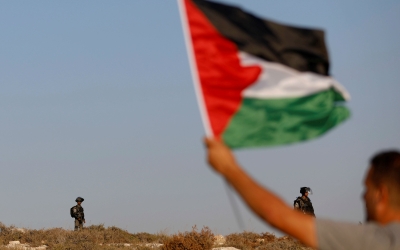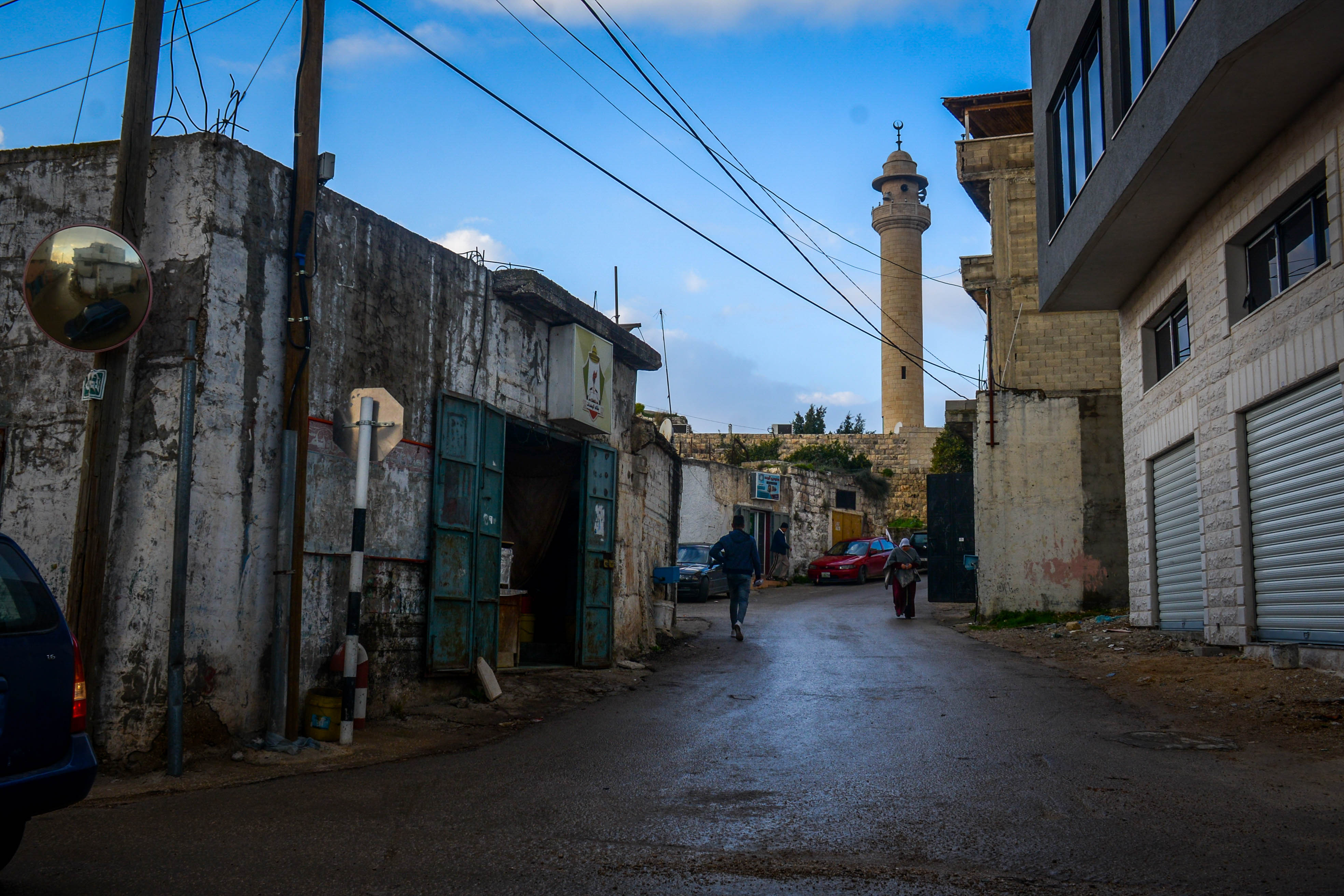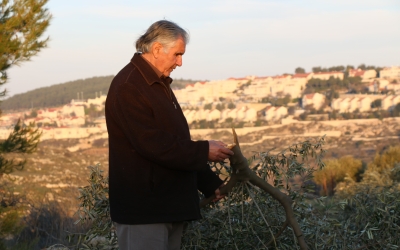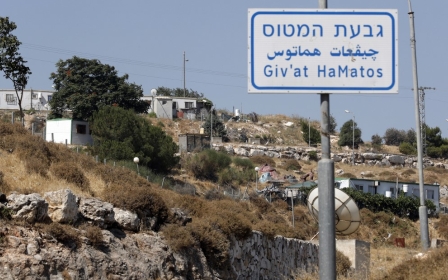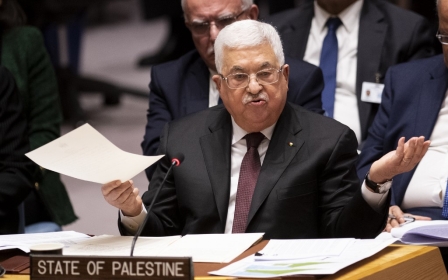Palestinian villagers ask why company exploiting West Bank quarry isn't it on UN list
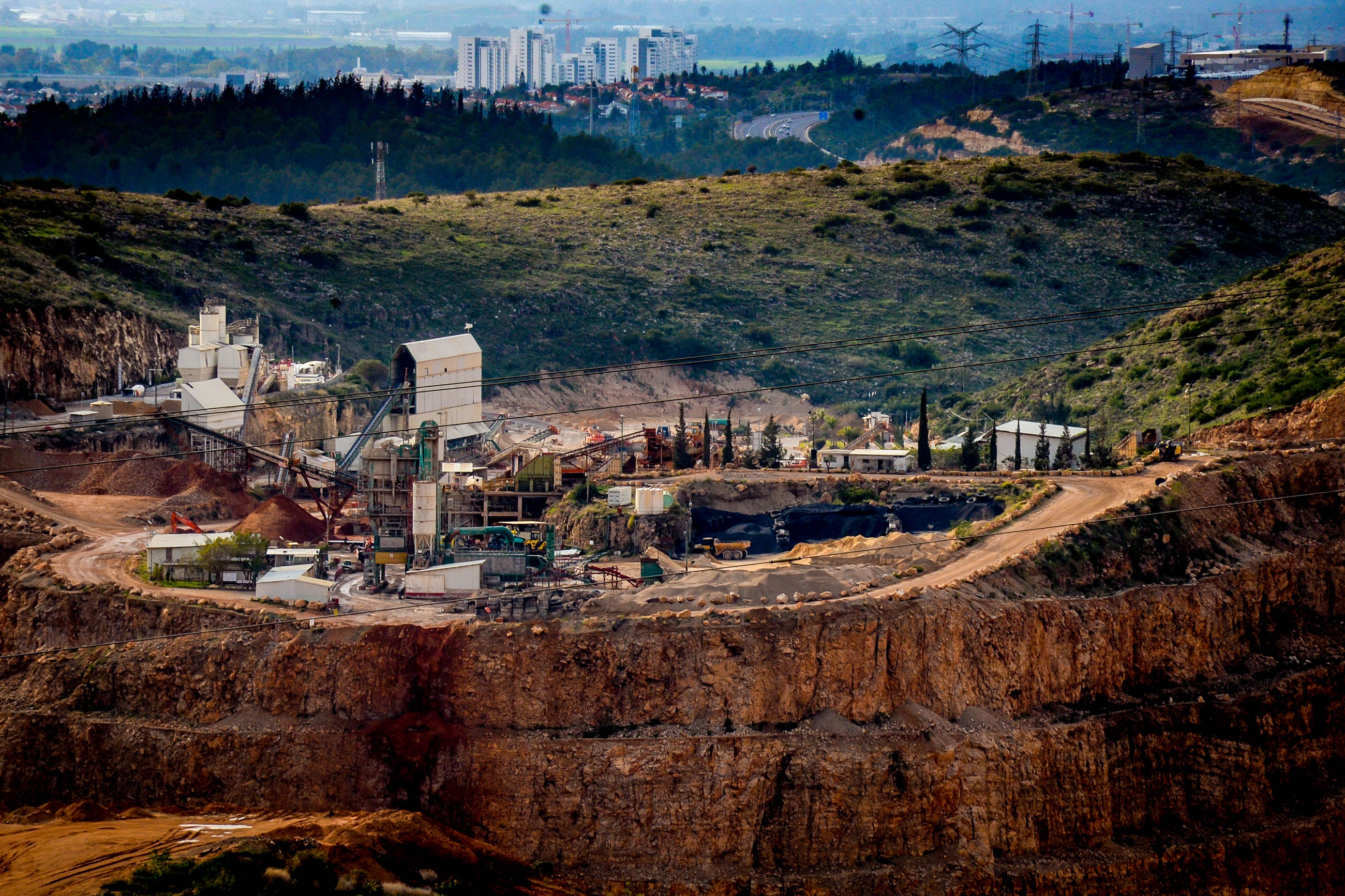
Palestinians had a small moment of celebration when the UN Human Rights Council on 12 February released its database of businesses profiting from Israeli settlements. But for Azmi Shuqeir from Al-Zawiya village in the northern West Bank, the celebration was short-lived.
The multinational that has been exploiting his land for his entire life was not included in the list. HeidelbergCement, a German building materials firm, was one of several companies well-known for their implication in the Israeli occupation, that were left out of the long-awaited database.
New MEE newsletter: Jerusalem Dispatch
Sign up to get the latest insights and analysis on Israel-Palestine, alongside Turkey Unpacked and other MEE newsletters
Shuqeir, 40, leads visitors through the green hills west of Al-Zawiya, up to an edge where he can't cross a step further.
“Down there is the annexation wall. Here it’s rather an electric fence,” Shuqeir said. He pointed: “And this in front of us is the Nahal Raba quarry, where HeidelbergCement operates."
An enormous hole interrupts the green landscape of the Palestinian countryside, cutting through the hills like a giant's bite.
“My mother gave birth to me in the fields down that hill. I grew up here,” Shuqeir told Middle East Eye.
“I used to play there and work our land with my parents throughout my childhood. The quarry was still small. They then built the fence in 2004 and we were no longer allowed through.”
Despite his disappointment, Shuqeir still believes that the releasing of the database “is an important step, but it is not enough”.
Lack of clear mechanisms
The Nahal Raba quarry is located within the area of the Israeli settlements’ Samaria regional council, which makes it a settlement itself.
The quarry was first exploited in 1986 by the Australian company Pioneer International, which was bought by Hanson, a British building materials company, in 1999. Nahal Raba was then in the hands of Hanson Israel until 2007, when HeidelbergCement bought Hanson. The quarry has been expanding ever since.
Shuqeir hopes that HeidelbergCement will be included in the database in the future.
Indeed, when the UN human rights council voted in 2016 for the creation of the database, the resolution stated that it should be updated annually. But the resolution did not say how this was going to be done and it did not provide a budget for it.
“The database is about more than just a list of names. It is supposed to entail a whole mechanism that guarantees it is updated annually,” said Wessam Ahmad, a member of the Palestinian human rights group Al-Haq.
With the lack of such a mechanism, companies like HeidelbergCement will have no incentive to end their work in Israeli settlements either to avoid being included in the database, or to be removed from the list.
Exploiting occupied land
In 2019, ahead of the publication of a report on Nahal Raba quarry, the Human Rights Resource Center and Al-Haq asked HeidelbergCement to respond to the accusations against its work in the area in question.
The company responded in a letter, arguing that “the Nahal Raba quarry is located on public land in Area C [...] No private ownership could be determined. Therefore no expropriation has taken place”.
Shuqeir dismissed this argument as unrealistic.
“The land belongs to the village. Our family has worked it all its life.”
At the age of 76, Shuqeir’s mother, Um Yousef, cannot accept the idea that it is not her land.
“I raised my children in the land while working it. I even gave birth to one of them in it. How could I let go of all that?” she said.
But even if there were no individual property rights, Ahmad said, HeidelbergCement’s exploitation of the quarry is still illegal.
“International law, especially the Hague regulations, makes it clear that the holder of the rights to an occupied public land and its resources is not the occupying force, but rather the occupied population, the Palestinians,” he said.
“Israel has no competence to give rights to private corporations in the land."
Work across the fence
International humanitarian law also states that any exploitation of natural resources in the occupied territory should be to the benefit of the occupied population.
HeidelbergCement argues, however, that 60 percent of its employees and contractors working the Nahal Raba quarry are local Palestinians.
“Palestinian and Israeli employees are treated the same and receive equal payment that is several times higher than the average wages paid in the West Bank,” the company said.
'Many workers cross the fence in secret to work at the quarry, risking their lives'
- Azmi Shuqeir
But Shuqeir laughed when asked his opinion on HeidelbergCement’s statement.
“It is our land, they took it and are making millions out of it. If some of us work there it is because they have no choice,” he said.
Palestinian workers need to obtain special permits from the Israeli military to cross the fence and work at the quarry, which most of them don’t.
“Many workers cross the fence in secret to work at the quarry, risking their lives,” Shuqeir points out.
The Boycott, Divestment, and Sanctions (BDS) movement, meanwhile, called for persistent civil society pressure on the Office of the High Commissioner for Human Rights "by resisting political pressure, whether from the US, European states or Israel, and committing to constantly updating the public list”.
Political pressure is believed to be part of the reasons behind the delay of publishing the database, which, Ahmad said, raises another challenge seeing that governments are the ones responsible for holding local companies to account.
“If these countries were opposed to publishing the database in the first place, it is improbable that they will take action to stop corporate complicity in the settlements."
A practical implementation of accountability that depends on states may limit the works of the United Nations itself in regards to the database.
“All UN bodies depend on contributions of member states, and, you know, the Human Rights Council has a budget too,” Ahmad said.
First line of defence
However, beyond legal details, the database can in fact be used in an effective way.
The general coordinator of the BDS national committee, Mahmoud Nawajaa, told MEE that through the pressure of boycotts and divestment, people, movements and organizations worldwide can hold corporations accountable.
In 2015, the Norwegian public pensions fund divested from HeidelbergCement, following citizen pressure exposing the company’s complicity in Israeli occupation.
'We are the first line of defence. Global action, with the use of the UN list, is an important support for us'
- Azmi Shuqeir, Al-Zawiya
The following year, a delegation of the Scandinavian Nordea Bank sent a delegation to Palestine, where they visited Al-Zawiya and Heidelberg’s quarry. Nordea Bank later divested from Heidelberg too.
“The delegation met with families who had lost lands to the quarry. They saw the effects on the village and how the extraction worked around the clock, 24 hours, carving the entire mountain out,” Shuqeir recalled.
“The most credible evidence is reality itself. Once you see it, you can’t ignore it.”
Nawjaa believes that the first step is for public institutions, city councils, churches, and others who might be involved with the companies on the US list to stop working and investing in them.
But for Shuqeir, “the most important guarantee in the face of settlements is nowhere but here. On this land.
He grabbed a handful of dirt and held it.
“We are the first line of defence. Global action, with the use of the UN list, is an important support for us.”
Middle East Eye delivers independent and unrivalled coverage and analysis of the Middle East, North Africa and beyond. To learn more about republishing this content and the associated fees, please fill out this form. More about MEE can be found here.


